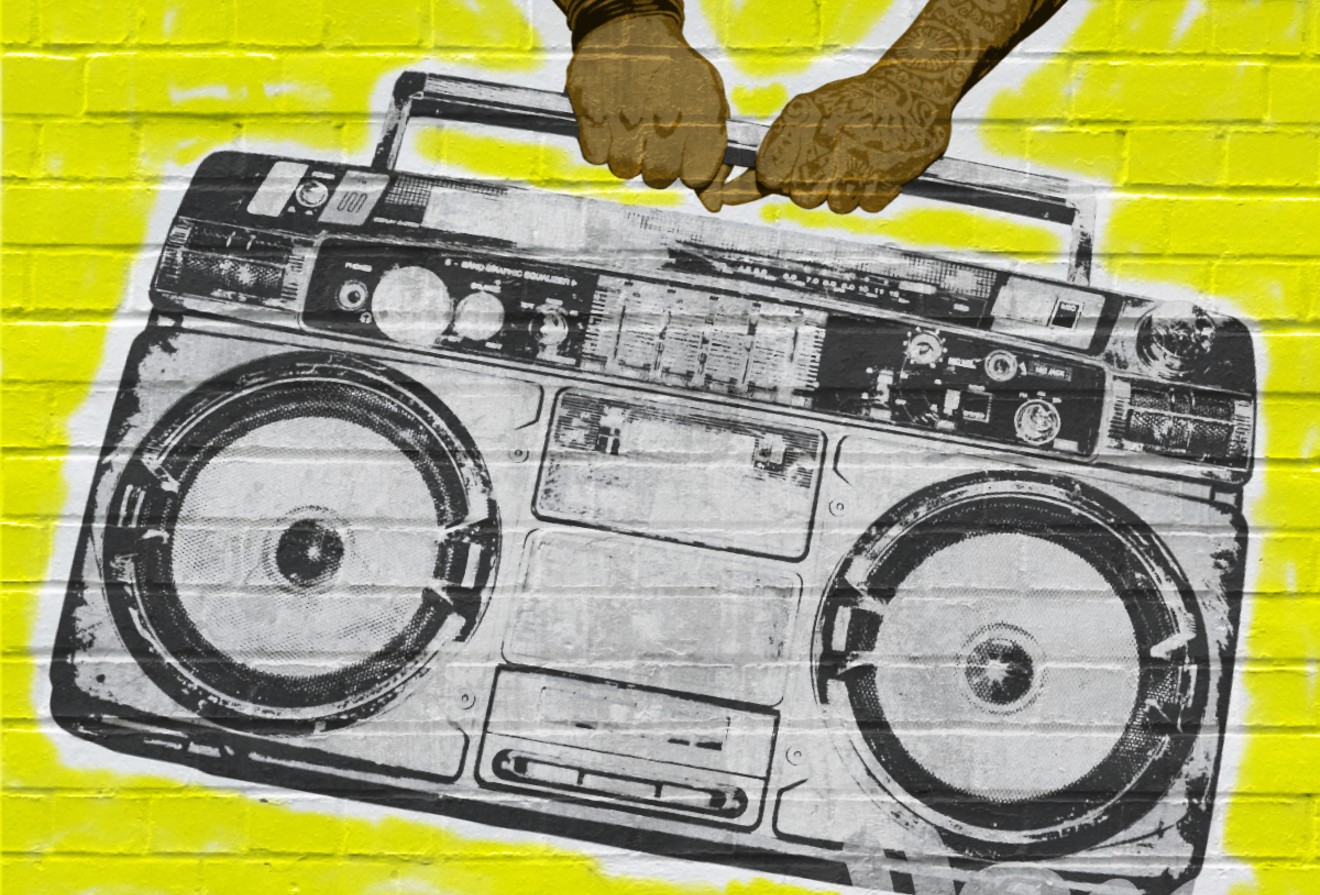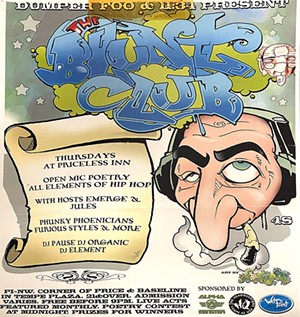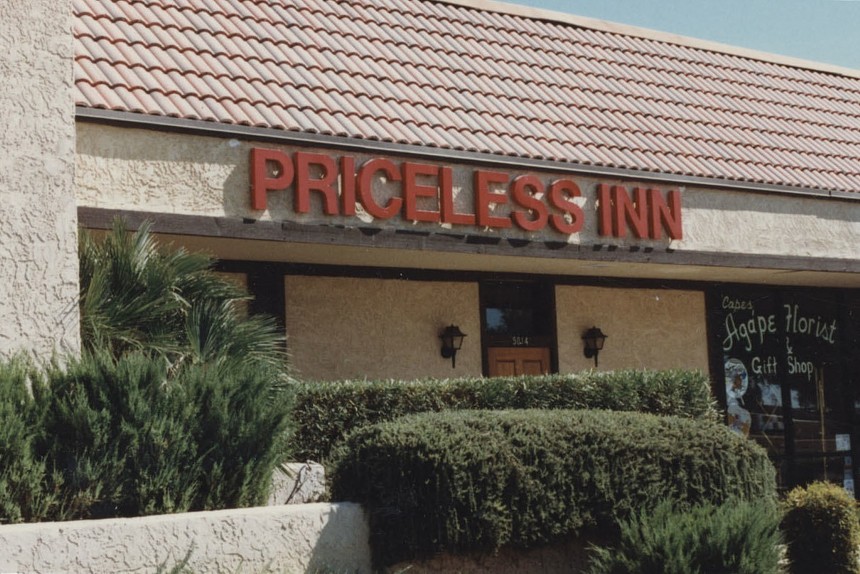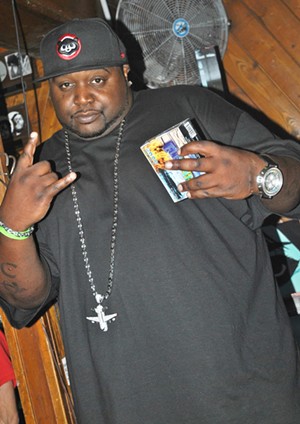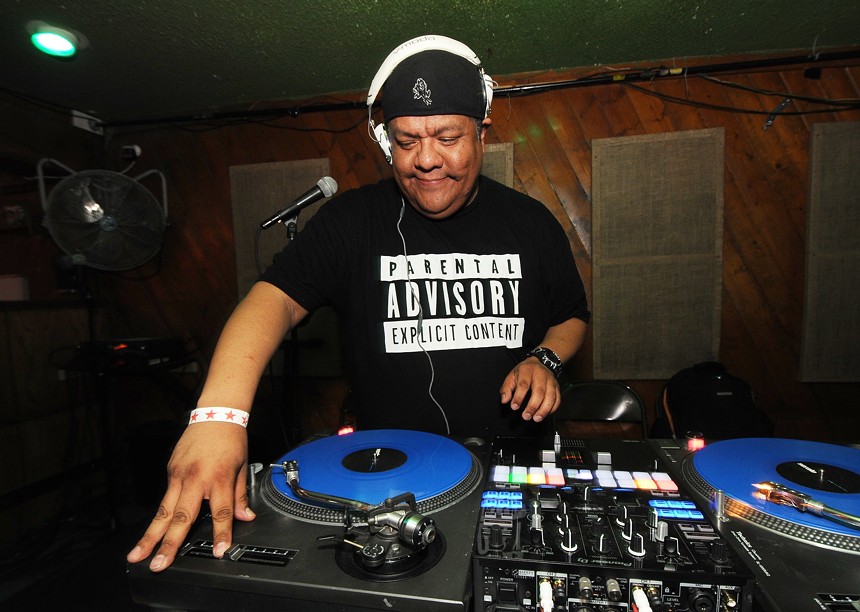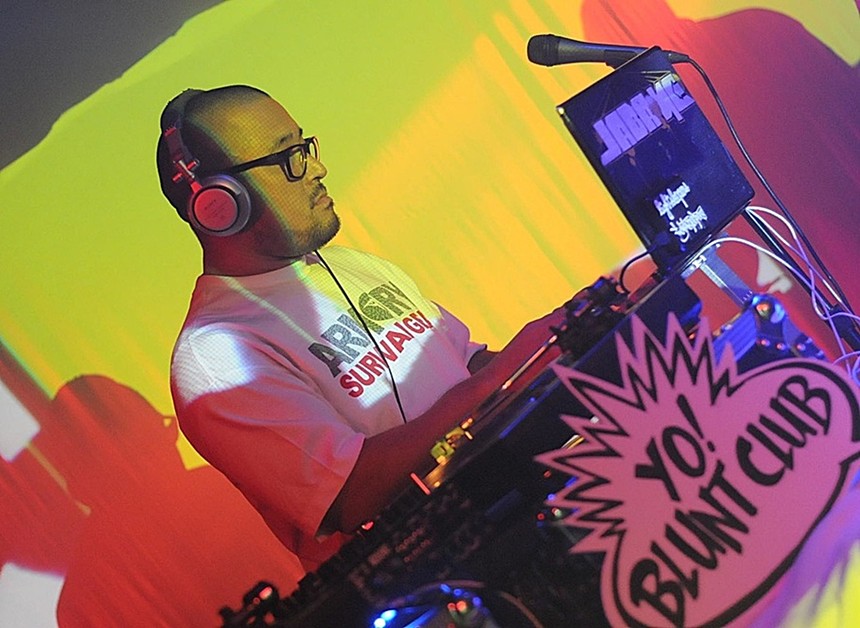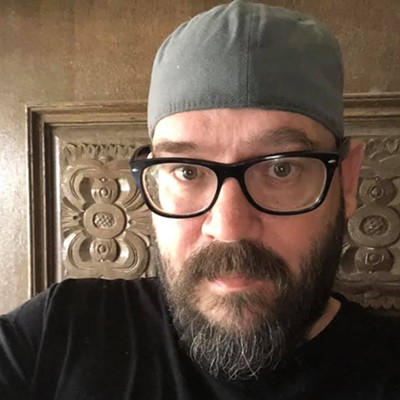"How many real hip-hoppers in the place here?"
It's a question being asked by local turntablist DJ Element over the house mic, and a crowd of hundreds of people packing the patio of Crescent Ballroom on a Saturday night in late March eagerly answer back with a roar of approval.
Satisfied with the response, Element goes back to spinning up hip-hop cuts by Beenie Man, KRS-One, and Anderson .Paak from a pair of turntables. Meanwhile, the crowd is in constant motion, bobbing and moving to the beats. Off to one side, a large circle has formed where dancers are showing off their moves. Some are actual b-boys and b-girls with skills to spare. Others make up for their lack of polished dance moves with enthusiasm.
They're all gathered for the homecoming of The Blunt Club, which celebrates the long-awaited return of the long-running local hip-hop night after an extended absence caused by the pandemic.
And it's like no time has passed. The energetic scene unfolding on Crescent's patio is similar to many previous editions of The Blunt Club that have taken place since it launched back in 2002. That includes the presence of Adam Dumper, the local painter, graphic artist, and promoter who helped launch the night 20 years ago at bygone Tempe sports bar Priceless Inn.
At the moment, Dumper is standing off to the side and chatting with friends between sips of his drink. Blunt Club's return coincides with the artist moving back to the Valley after living in Portland for five years.
"It's good to be back and to get this thing going again," Dumper says. Longtime fans of The Blunt Club would agree.
For most of the past 20 years, The Blunt Club showcased all four elements of hip-hop culture – DJing, rapping, graf art, and b-boyism/breakdancing. A brainchild of Dumper, former bar owner Keith Nichols, and local MC Emerg McVay, the night helped influence the Valley's hip-hop scene and gave a platform for local artists and sense of community for hip-hop fans.
It also featured scores of underground and indie hip-hop artists, including such legendary names as Planet Asia, Aceyalone, Pep Love, Rob Swift, Jeru tha Damaja, Oh-No, Murs, PFC, Diverse, Blacksheep, Abstract Rude, Busdriver, 2Mex, Souls of Mischief, and Guru.
The Blunt Club has been a movable hip-hop feast over the years, first as a weekly and before becoming a monthly, occupying the calendars and stages of such local venues as now-defunct Hollywood Alley in Mesa and Tempe's Yucca Tap and Club Red.
The longest-running hip-hop night in Arizona and quite possibly the entire U.S., The Blunt Club's longevity is unheard of among club events, which typically tend to last a few years. Its fans have been loyal and diverse.
"To me, it's given local hip-hop heads a community for decades. Local performers, DJs, dancers all embraced it," says local MC Michael "Mic Cause" Cosentino of Drunken Immortals.
This weekend, Consentino and numerous other Blunt Club DJs, rappers, and regulars will gather at the Pemberton in downtown Phoenix to celebrate the 20th anniversary. Phoenix New Times spoke with many of them about the night and what it's meant to them and to them and others in the Valley's hip-hop scene for an oral history looking back on the 20-year journey of The Blunt Club.
Blunt Club's Beginnings
The origins of The Blunt Club are rooted in the local nightlife and hip-hop scenes of the late '90s and early 2000s. In spring 2002, Valley resident Keith Nichols and his family sold now-defunct Tempe dive and music venue Boston's, which they'd owned for 11 years. His parents then bought sports bar Priceless Inn near Baseline Road and the Loop 101 freeway. Keith, who also managed popular local rap-metal group Bionic Jive, wanted to start a club night at the spot blending spoken word and poetry with trip-hop and art.
It wasn't a foreign concept in Valley nightlife of that era, as events like Move '98 at Boston's or the Bombshelter DJs' Mission Control night at the old Nita's Hideaway mixed music with elements like live art or b-boyism.
Nichols huddled with rapper Bionic Jive frontman Emerg McVay and the two came up with the concept and coined the name for the night: The Blunt Club.
Emerg McVay, rapper and Blunt Club co-creator: Back in [Bionic Jive's] Interscope Record days, we were on the Devil's Night Tour with [hip-hop groups] D12 and Keith was on the road with us. The tour was ending and Keith and I were trying to figure out something to do to occupy our time when we came back. So he was like, "I got this one kid I know back home that has a decent following and everything. I'll give him a call and we'll start something up with him." So he called Dumper right from the tour bus.
Adam Dumper, artist and Blunt Club co-creator: Spoken word was really big back then with Def Poetry Jam on TV. I was working at [now-defunct Tempe art store] Wet Paint at the time, and had been painting and doing stuff at shows and events like Move '98 for years. So Keith and Emerg came at me and were like, "Yo, we gotta do this trip-hop night with spoken word, painting, and DJs and shit like at Move '98. And was like, "Cool."
Jim Mahfood, artist and former Valley resident: I lived in Arizona [in the early 2000s] and went to Mission Control and [the Bombshelter DJs] invited me onstage to do live art. It wasn't just people sitting there listening to DJs spin records. It was a full sensory-involved experience with b-boys, music, and culture, which eventually became the formula of The Blunt Club.
The Blunt Club debuted on a Thursday night in May 2002. At first, crowds were sparse and amenities were slim. Instead of a stage, people performed in one corner by a Golden Tee game and the restrooms. Things slowly began changing, though.
McVay: It was supposed to be a poetry night where people come out, spit their poems, have some drinks at the bar, that type of shit. I'd be the emcee, Dumper would be the graf artist, and we always have a DJ there to play music.
Mr. Hyder, former Blunt Club DJ: I was one of the first resident DJs there, one of the original four [founders] with Dumper, Keith, and Emerg. Back then, we wanted it to be something chill that wasn't necessarily a show.
Aran "Catalyst" Kelly, local poet: I got to perform spoken word at the very first Blunt Club. I'd met Dumper through his roommate [at the time] and one night he called me and went, "I'm opening up this venue called The Blunt Club with elements of the hip-hop culture and it's going to have an open mic with poetry." And I was like, "Yo, sign me up." There weren't many there the first night, like maybe only eight people, but the atmosphere was really cool.
Michael "Mic Cause" Cosentino, MC in Drunken Immortals: It was a small niche crowd for a while with this really chill kind of coffeehouse/art gallery vibe.
Sean "Crash" Seibert, longtime Blunt Club patron: People would bring their black books and just sit and draw and vibe out to the music. Catalyst ran the spoken word and Dumper did live art with Sharpies on foamcore.
Dumper: [Wet Paint owner] Jes Jordan and I hung a bunch of art all over the walls at Priceless Inn. And we brought out six or seven live painters every week. At the end of the night, we'd throw open the mics for poetry with Emerg hosting.
Cosentino: People all over town knew Emerg from Bionic Jive, and he's an OG member of the hip-hop scene. So it definitely lent Blunt Club some credibility early on.
Pickster: He's traveled all over the world with Eminem and Proof on a ton of other tours. He's a seasoned pro and the kind of person who gets people's attention. If he talks, you listen. He's a funny guy. A good host is like gold.
Dumper: Emerg brought it [back] in the day, keeping everybody happy and making sure they're into the show.
Kelly: Things didn't catch quick at first, but all the ingredients were there. Adam was busting his ass every week, like calling everyone he knew to come by.
Pickster: It was very raw at the beginning. I went for years before joining up and I remember it being all downtempo, jazzy trip-hop with poetry. And then it slowly began shifting to hip-hop.
McVay: After a few months, people just came out to spit their poems. Then it started evolving where people wanted to do poems with instrumentals. Then people wanted to bring in drummers and guitarists [as accompaniment] for their poems. And then they ended up performing their songs. Next thing you know, it was becoming more of a full-on hip-hop thing.
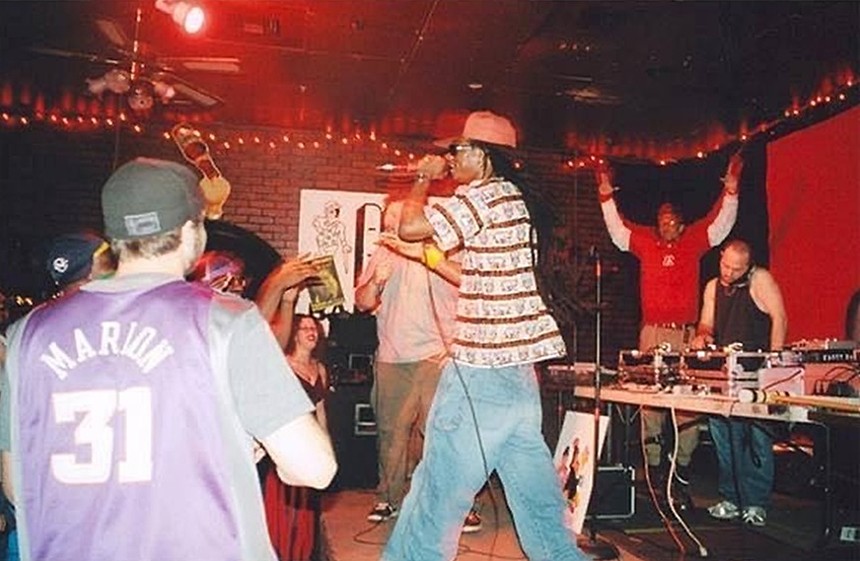
Dumper: Eventually we started having performances, bringing out more DJs, and kept building it up from there.
Kelly: Because of Adam's hard work and Blunt Club getting bigger, the owners of Priceless Inn decided to put a stage in there.
McVay: About three or four months in, it started to evolve into a live performance type of venue. And the b-boys used to just come in to hang around and drink, like the [members of] Furious Styles Crew.
Edson "House" Magana, b-boy and co-founder of Furious Styles Crew: I started going close to the beginning when it was still largely spoken word, but it took a while before it became b-boy heavy. If you were any kind of a hip-hop head, you were going to gravitate towards those places.
Mahfood: Dumper brought me in a few times and made sure the artists were on stage, so it felt like I had equal billing with the talent. This was way before Serato [DJ software and laptops] so the DJs had all these crates of records. You'd be painting and trip over the crates while getting your supplies.
McVay: As the Blunt Club evolved and all of the entities [representing] all the elements of hip-hop, we decided to go ahead and flip it and make it a hip-hop spot. The moniker became, "It's for the writers, the breakers, the DJs, the MCs, and to up your knowledge of hip-hop."
The Blunt Club started blowing up after Dumper featuring touring hip-hop artists on the regular.
Dumper: I started booking [hip-hop] acts during our second or third year. I brought out were Z-Man, DJ Qwest, and Sacred Hoop for one of our first shows. The second one was Grupo Fantasma plus the funk group Brownout, which was a big show for us at the time.
Hyder: Grupo Fantasma gave the Blunt a whole new vibe. And a whole bunch of new people came to check out the music.
Rok Knowledge, MC with The Society of Invisibles: If you were a local hip-hop head, The Blunt Club was where you wanted to be.
Ill Al, local MC: I remember being at Blunt Club during the P.I. days. I'd formed [local hip-hop collective] Avenue of the Arts and we'd go see shows by Drunken Immortals, Morse Code, or different Valley hip-hop groups back then. What sticks out the most was getting to connect with like-minded people and artists. There were always a lot of b-boy circles happening at Blunt Club.
Magana: At a lot of more regular [nightclubs], you were getting kicked out for breaking or they'd stop you. So Blunt Club became a home for breakers, b-boys, poppers, and lockers. They've always made space on the floor for cyphers by breakers and dancers. It's something that's been embedded into the programming of Blunt Club.
Dumper: We started having shows all the time and I brought on Doug Quick around that time as a partner.
Doug Quick, former Blunt Club booker: Dumper wanted more DJs and rappers in there and asked me to help with booking and marketing. I was Drunken Immortals' manager at the time and doing booking on the side.
Dumper: Doug and I knew bands who were touring through Arizona, and as we started bringing those guys out, word started traveling. Next thing you know, we're getting hit up all the time by DJs and hip-hop groups that were heading our way.
Hooray for Hollywood Alley
In early 2005, The Blunt Club left Priceless Inn after the bar underwent a change in ownership. There were other factors involved in their decision to move the night, Quick says.
Quick: At some point, we showed up one night and found out Priceless Inn had been sold. The new owners replaced a lot of the staff and it changed the vibe really fast. After two or three weeks it got weird, so me and Dumper decided to move. We wanted to go to Hollywood Alley just across the [Loop 101] freeway, but had to wait for their calendar to open up so we'd have Thursdays.
Dumper: Priceless Inn wasn't the biggest place and we needed a larger venue. We ended up doing Blunt Club at Rio Salado Brewing Company on Mill [Avenue] for a couple months because we didn't have anywhere else to go until we landed at Hollywood Alley.
Rob "Fun Bobby" Birmingham, former Hollywood Alley booker and bartender: Blunt Club became our Thursdays for years. They were all respectful to everyone, from Dumper and his crew to the crowds, and never gave us trouble. They were more into breakdancing than breaking urinals.
Dumper: [Hollywood Alley co-owner Ross Wincek] is an awesome guy. We had some of my favorite times there. It was good food, good people, and had an "anything goes" kinda thing going on.
Quick: Hollywood Alley was more of a venue than Priceless Inn and had more of a legit stage and sound system. And once we got there, we went crazy with the booking and things kept blossoming.
Dumper: Our first couple of weeks at Hollywood Alley, I tried bringing in the weirdest shit imaginable. I had a wushu kung-fu team come in with swords, staffs, knives, and nunchucks. They did a whole show in the middle of Hollywood Alley where dudes were kicking the ceiling and flinging these friggin' [guandao] staffs with blades on the ends. It was the coolest shit I've ever seen. We were kinda worried about having the right insurance. Ross loved it and was laughing the entire time.
Quick: We started booking shows with [local hip-hop promoter] Universatile Music after we got to Hollywood Alley and if [UM co-owner Michael Horowitz] needed a Thursday date for a group, he'd come to me and see if we could turn it into a Blunt Club night.
Dumper: Black Sheep was a really cool one to bring in, even though only Dres wound up coming. It was this legendary New York artist who all our DJs had been playing for years.
Quick: Aloe Blacc would come out from L.A. before he was gigantic. Dumper had connections with some L.A. hip-hop heads and that worked out. We also had Gift of Gab, Blackalicious, and Souls of Mischief. We were all fans and grew up listening to them and wanted to book them.
Birmingham: Even when Dumper didn't have some sort of big marquee name every week, the big crowds were still consistent. Just all the regular DJs, b-boys, b-girls, and hip-hop fans. It was solid every fucking week.
Quick: The crowds were so varied. People from south Phoenix and downtown. Tattooed kids and rockers. EDM DJs and college kids. I used to just walk around during the Hollywood Alley days, and see every race and kind of person. We weren't doing the kind of nights you'd see in Scottsdale clubs.
Il All: What sticks out the most was getting to connect and meet with like-minded people and artists. We got so many show opportunities through Blunt Club. Dumper was super open to getting new people on and connecting people together. That whole community vibe.
Mega Ran, rapper: My fourth or fifth show in Arizona was at the Blunt Club. And I remember a lot of my friends being like, "Woah, that's a big deal!" And I didn't know because I'd just moved here and I didn't know the history. So then I started Googling and doing some research and I realized, "Oh, this is a big deal. This is like the longest-running hip-hop thing" [in Phoenix]. So I took it very seriously. I had a really good time.
By that time, Blunt Club was at Hollywood Alley, its roster of local DJs had also gotten bigger as turntablists like Element, Tricky T, and Pickster One were performing on the regular.
Pickster: Each resident DJ always brought something different. Hyder is the dude that always surprises you. He's never played the typical hip-hop classics and always pulled something out of nowhere. You'd be like, "Where the fuck did you get this?"
Dumper: Pickster brings a lot of variety of music to the table, but he's still playing stuff that's the core of our night. He can play from reggae to dancehall to hip-hop to b-boy stuff to funk or whatever and mix it all together and it's like the perfect ride.
Pickster: Element's one of the best scratch DJs in Arizona. Him and M2, those dudes are the cleanest scratchers around. We had D-Styles, one of the best turntablists in the world, and he saw Element and was like "Woah!" Tricky is one of my favorites to watch because he has these crazy transitions and a really unorthodox way of mixing. We were lucky to have DJ Radar as a resident and he was awesome.
DJ Shortkut, San Francisco-based DJ/turntablist: Pickster and them brought me out in the mid-2000s. I remember being able to just play that raw hip-hop shit and be able to fuck around. Just doing my own thing. It kinda reminds me of spots we had in the Bay Area where DJs can do whatever they felt like and focus more on their music and their craft.
Pickster: We've always had that classic hip-hop feel that everyone grew up on and loves. We've just always kept that. We never really went for the mainstream, newest Top 40 stuff. We occasionally mix it in because once in awhile there is good Top 40 songs, but for the most part we've always maintained a focus on good hip-hop. Really it's our crowd who want to hear that stuff and come back because they know what they're gonna get. It's funny because we've had some of the best DJs come through and they try to do what they're used to, like rank-and-file shit, and we tell 'em, "Just play some hip-hop." Sure enough, by the end of the set they say, "I haven't been able to do that for years." Its just classic party hip-hop you don't hear elsewhere, man.
The Night Public Enemy Came By
In December 2006, Dumper and Quick pulled off a coup by talking legendary rap group Public Enemy into performing at The Blunt Club.
Quick: Public Enemy had a comic book out at the time and had an in-store signing [at Atomic Comics at Metrocenter] and they were also performing in the parking lot.
Pickster: Their concert at the Marquee [Theatre] that night wound up being canceled, but they were still doing this signing.
Dumper: We offered them what we imagined we could pull out of our ass that night, a couple thousand [dollars] maybe. We're like, "You wanna play instead of driving to the next city?" So they do their set and still haven't told us whether they're in or not, and Chuck D. announces, "Hey, after this, we're going to be at The Blunt Club." And [we] went, "Oh, shit."
Dumper: By the time we got over to Hollywood Alley, there were 300 people lined up outside. Around midnight, there was this bang on the back door and Public Enemy's security came in with flashlights and started moving people around.
Cosentino: And then in walks [Public Enemy and] Chuck D. starts doing all their old-school joints: "Nation of Millions," "Fight the Power," and "Bring the Noise."
McVay: Public Enemy didn't rob the crowd of their full show. They played for more than an hour and gave us the show that they would've gave a bigger venue. To see Chuck D up there ripping such a small stage and with such an intimate crowd was incredible.
Roqy Tyraid, local MC: I was underage at the time and snuck in. There's no way to describe how important that was to me. It was my entry point into The Blunt Club. I was an up-and-coming rapper and remember getting into cyphers in a parking lot [after the show]. It was such a hip-hop experience.
Professor Griff, former member of Public Enemy: Yeah, that [show] was a minute ago, man. I remember Arizona, of course. I remember the good people [and] how we got treated was very, very wholesome.
Justus Samuel, co-owner and promoter of Respect Tha Underground: That shit was legend and put Blunt Club on the map. It wouldn't have happened unless they made it happen.
Dumper: We definitely got bigger after Public Enemy.
Heading For Club Red
The Blunt Club eventually got so big that in 2008, its promoters felt it was time to move again, this time to now-defunct Tempe venue Club Red and its adjacent bar, Red Owl.
Dumper: Our shows were getting bigger, the acts approaching us were getting bigger, so we needed to find a larger space in the same part of town. We'd gotten an offer from Club Red to go there, so that's why we moved.
Quick: Once we got to Club Red, that's when we started doing more partnerships with UM, who were getting bigger and better acts. A lot of are shows became really large scale where we drew 700 or 800. We still had locals out and our usual elements, but things were more performer-driven.
Dumper: Digable Planets and Evidence were both really cool shows we did with Universatile Music. Word really got out to other states by then, because we had so many groups coming through on a regular basis that if you were touring the Southwest, we were probably the place to play.
Shortkut: We know about it in the Bay Area, that’s for sure. It’s like, "If you're in Phoenix, you've got to do a set at the Blunt Club."
Murs, rapper and former Arizona resident: The Blunt Club is an Arizona institution. At Coachella, I've met people who'd say, "Oh, I saw you at Blunt Club." In Germany, I've had people say, "I've seen you at Blunt Club." Around the world, wherever I go, people know The Blunt Club.
Samuel: The Blunt Club has really catered to the indie hip-hop, conscious, and backpack styles [of hip-hop] whereas Respect Tha Underground and other promoters have catered to the grittier, more street side of [hip-hop]. That's not a slight; they have their lane and have owned it. What they've done was necessary, so there's been a balance to the [Valley] scene.
Quick: Stuff like [backpack, indie, conscious rap] is what a lot of us have been into, so we booked what we liked. We definitely weren't a mainstream night. The people who went there were artists themselves. The crowds were full of really talented MCs, DJs, and graffiti artists.
Pickster: There's been a few hip-hop weeklies that have popped up but none of 'em were in direct competition with Blunt Club. Even when like [bygone hip-hop night] Groove Candy moved to Thursdays, people tried to make that a big deal out of it [in the late 2000s].
Dumper: I think people who were trying to compare two different types of hip-hop nights that were doing things that really didn't have anything to do with each other. We were doing our stuff and they're doing R&B and more rap. We've all gone to each other's nights and were cool with each other.
Kelly: I started a night, The Speak Easy, at Yucca with a few others and I have Dumper to thank for that. Full credit. He helped pave the way.
Changing Things Up
By 2010, the Blunt Club underwent a number of changes. It moved to Tempe's Yucca Tap Room and both McVay and Quick amicably parted ways with the night.
McVay: I just couldn't commit to doing it every Thursday. Bionic Jive was battling with our record label and I was struggling to make a living. There was so much shit going on and I couldn't afford to be there 50 percent of the time. I felt like I'd be letting the guys down, so I stepped down and let some of the other dudes step up in my place. It turned out to be okay, and The Blunt Club didn't miss a beat.
Quick: We kind of came to the end of the era where it was huge show after huge show and it started hurting us where some nights [the cover] was $10 on nights where we just had locals only. The [financial] crisis was still going on and it got where one week would be 200 people and 400 the next. There was inconsistency. And it felt like we kind of wanted to get back to the roots of what Blunt Club was, so we started talking about moving it to Yucca. Then at that meeting, I also told [Dumper] I was moving to Flagstaff in six months with my family. I just wanted to help get them to a new place and then I was out.
Quick: Doug had to step away cause he had kids and was doing dad stuff, so me and Pickster started running things.
Pickster: After Emerg left, we had a few different hosts, like [local rappers] Reuben Martinez and Mouse Powell.
Mouse Powell, local rapper and former Blunt Club host: I grew up on Arizona hip-hop and was a fan of Blunt Club when I was a teenager. I was super-envious because I was underage and couldn't get in. After I turned 21, I was there every Thursday. I had an album release party there in 2011 and shortly afterwards started hosting. It for sure gave me other opportunities and really helped me grow as a performer. Because it helped with my crowd work immensely, just working every Thursday and having to figure out a way to make something interesting. It gave me an opportunity to perform without actually having to perform any songs.
Knowledge: Myself and DJ Mattlocks, we co-hosted the Rhyme & Reason show on 101.1 The Beat together. We became very close to Illa J, who was the brother of [now-deceased rapper] J Dilla. And we actually got Illa J booked at The Blunt Club to perform at Yucca. We're standing off to the side of the stage near the bar to myself and Matt, I was performing. Matt and I just looked at each other and we said "Man, that's Dilla". Just the way he was carrying himself and the vibe. It was like Dilla was there.
Powell: We did a show with Cannibal Ox. That was also a benefit for my friend Jeremy Hacker. And I thought that was just the cool thing that Adam helped put together. It was just my buddy was going through a fight with cancer and he booked his favorite rap act and threw a show together and donated a bunch of money to his cause.
By late 2014, the strain of running the Blunt Club every week got to be too much and Dumper decided to turn it into a monthly event.
Dumper: I think it was beginning to wear us out with doing it every single week. It just felt like we started getting sloppy. And some of us had kids and families. So we refocused on doing one really good one a month, which was a better move for us, we thought.
By then, Dumper had begun expanding The Blunt Club to other cities, both in Arizona and up the West Coast.
Dumper: We started doing Blunt Club in Flagstaff and had Zion-I out. The power went out during his performance when someone pulled the breaker and he started rapping with just a flashlight to 200 people. In 2013, I brought Blunt Club in Oakland for a couple of years and then took it to San Diego and Hawaii. So we were trying to branch out with the brand.
Dumper eventually decided to make some moves of his own. In 2016, he relocated to Portland while the Blunt Club carried on in his absence. The night was also being held at multiple bars and venues around the Valley, including Crescent Ballroom and Valley Bar.
Dumper: I left Phoenix for a few years because I needed a change of scenery after spending most of my life here. I kept helping Pickster put it on after I left.
Pickster: Even though he moved away for a bit, we kept Blunt Club going because it's become this signature thing in Phoenix and we didn't want it to end.
Mahfood: That's a testament to Blunt Club and how strong it is. I mean, shit, Dumper moved away and it kept going.
Dumper: The one thing that finally stopped it, a least for a couple years, was: During the pandemic, I chose not to do it, figuring the best thing for us to do was to take a break and wait things out and COVID calmed down.
In March, the Blunt Club returned after a two-year hiatus, which coincided with Dumper moving back to the Valley. So far, events have been staged at Crescent Ballroom and The Pemberton.
Dumper: We wanted to come back in time for our 20th anniversary. We're still trying to find our groove until we land somewhere and say this is the spot for us. Plus it keeps people on their toes. It's going to be a monthly for right now until we find a place where we'll do it every other week.
Mahfood: The fact that Blunt Club has been around so long is mind-blowing. I've got many friends who are professional DJs and if you can keep something like a weekly or a monthly going past two or three years, it's considered a success. So to be around for 20 years or more, it's totally unheard of.
Murs: The longevity of Blunt Club speaks to its authenticity. Nothing has staying power that isn't genuine and classy. I think that's why I've heard about it all over the world, because it didn't happen for just a year or two. It's world-renowned. Blunt Club is definitely one of the most world-renowned hip-hop nights.
Samuel: Blunt Club has been a staple of Phoenix hip-hop. If you didn't attend Blunt Club at least 100 times in your existence out here, you probably weren't a part of the scene.
Editor's note: Some quotes were edited or condensed for clarity.
The Blunt Club's 20-year anniversary celebration will take place at 6 p.m. on Saturday, May 21, at The Pemberton, 1121 North Second Street. Admission is free.

